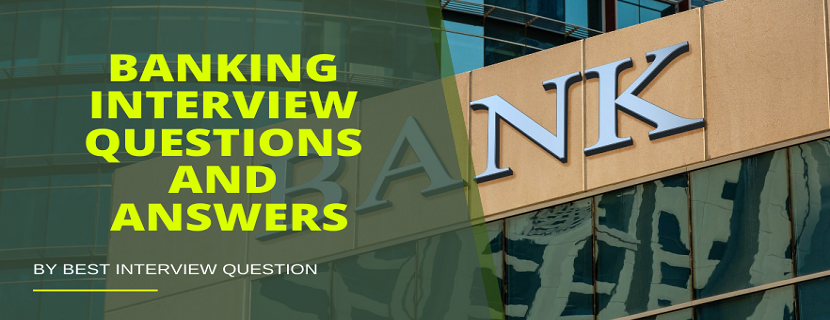Banking Interview Questions and Answers

Banking is an industry of money. Banking includes handling cash, financial transactions, credit and debits of the accounts, etc. In simple words, we can say that Banking is all about taking care of the money which is owned by individuals and entities. Our vast collection of Banking Interview Questions are the best resources for cracking your interviews.
Importance of Banking
- Banks provides several saving schemes which in return attract the people to save money.
- Provides secure money transactions all over the globe
- Provides loan to the agricultural sector at a very low-interest-rate that indirectly affects us.
- Generate employment for all the sectors of society
Most Frequently Asked Banking Interview Questions
Core stands for Centralized Online Real-time Exchange. Core banking is a banking service that has been provided by a group of networked bank branches where the customers can access their bank accounts and can also perform the necessary transactions from any of the member branch offices. This Application is for retail banking.
A bank is considered as a financial institution which deals with money matters. In a bank, customers can deposit and borrow money, and also it takes care of their financial stabilities.
There are two types of banks:-
- Retail Banking
- Business Banking
- Corporate Banking
- Private Banking
- Investment Banking
The commercial bank includes short-term loans to small business and individuals, withdrawals and deposit of money, savings accounts, home mortgages. The money that the customer deposits in the bank is utilized by the bank to give a business loan, personal loan, mortgages and home repair loans.
Types of Commercial Banking
- Retail or consumer banking
Retail Banking service is provided by the bank for the general public and for the small businesses. - Corporate or business banking
Business banking is the service which is provided by the bank for the large-sized and middle-sized businesses. - Securities and Investment banking
Investment Banking does the financial transactions or creates capital, assist in mergers and acquisitions on behalf of the corporations, individuals and governments. - Non-traditional options
There are various non-bank entities which offer financial services precisely like what the bank provides. The non-bank entities are credit card companies, credit card report agencies, etc.
This is the favorite interview question in banking interview questions.
There are six types of account in banks:-
- Current Account:- This account is for people with businesses, firms, and companies. Any number of transactions or the amount of transactions customers can do in a day.
- Savings Account:- This account is used by the public for saving the money. Any person can open the account single or a joint account. The advantage of having a saving bank account is bank pays the interest on your savings.
- Recurring Deposit Account: -This account is opened when a person wants to save a certain amount of money every month and earn a high rate of interest.
- Fixed Deposit Account:- This account is opened when a person wants to put a specific amount for a particular time and get a high rate of interest.
- DMAT Account:- This account is used to perform the transactions on the shares.
- NRI Account:- This account is for the Indians who are settled out of India.
The documents required for KYC are:-
- Identity Proof:-Passport, Driving Licence, PAN Card, Voter's ID Card, Aadhaar Card
- Address proof:-Passport, Driving Licence, PAN Card, Voter's ID Card, Aadhaar Card
- Recent photograph
Point to be noted: Go through this Q&A very thoroughly as this is one of the critical banking interview questions.
The different ways to operate my accounts are:-
- Internet banking
- Mobile banking
- Going to the Bank
- ATM ( Automated Teller Machine)
A crossed cheque is a check which has been passed with two parallel lines on the top left-hand corner of the check. This cheque cannot be encashed at the bank’s cash counter. This cheque can only be credited to the payee's account. The crossed cheque provides the security to the payer.
CAPM stands for the Capital Asset Pricing Model. This model explains the relationship between the systematic risk and the awaited return for assets mainly stocks. CAPM is used in finance for pricing the risky securities and as a result, generating the required rate of return of an asset.
The rate of Return can be calculated by the formula:-
The price of Return=Current Rate-Initial Value
Types of banking:-
- Retail Banking
- Business Banking
- Corporate Banking
- Private Banking
- Investment Banking
Retail Banking
Retail Banking is also called as Consumer Banking or Personal banking. Retail Banking service is provided by the bank for the general public and the small businesses. Retail banking includes personal loans, debit and credit cards, saving accounts, current accounts.
Business Banking
Business banking or Commercial Banking is the service which is provided by the bank for the middle-sized businesses. Business banking includes business loans, investment products, financial products which functions as a business for getting a profit.
Corporate Banking
Corporate Banking is also a business banking service which is provided by the bank for the large size business like Finance Institutions and corporates
Private Banking
Private Banking is the service provided by the bank to the HNWI (High Net-Worth Individuals). They are those individuals who hold financial assets with a value much more significant than 1 million US dollars. Private Banking services include wealth management strategies.
Investment Banking
Investment Banking is related to investments in the financial market. Investment Banking does the business transactions or creates capital on behalf of the corporations, individuals and governments.
The banking interview questions we are mentioning below will help you to gain enough of the knowledge of becoming an effective team leader.